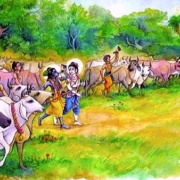Chapter Three: Nama-aparadha
Mahanidhi Madan Gopal Das
Nama-aparadha is an utterance of the holy name that is made with enmity in the heart. It is the lowest form of chanting wherein one commits any of the ten offenses against the holy name. As long as one chants with offenses, it is absolutely impossible to attain love of God.
“Offenses against the holy name (nama-aparadha) are the most frightening of all kinds of sins and offenses. All other kinds of sins and offenses go away naturally and automatically as one utters harinama, but nama-aparadha does not go away so easily.” (Jaiva Dharma ch. 24)
The lives of Vijaya Kumara and Vrajanatha depicted in Jaiva Dharma show that continuous chanting of Hare Kṛṣṇa japa frees one from material desires, and quickly elevates one to the perfectional stage of kṛṣṇa-prema, pure love of God. If these signs of spiritual advancement are not manifesting, one can conclude that he is a nama-aparadhi. Such an offender must understand that the holy name is the only shelter for one who offends the holy name. Filled with repentance and remorse, one must beg the holy name to forgive him and accept him in His service once again.
“In the book Nāma-kaumudī, it is recommended that if one is an offender at the lotus feet of a Vaiṣṇava, he should submit to that Vaiṣṇava and be excused. Similarly, if one is an offender in chanting the holy name, he should submit to the holy name and thus be freed from his offenses.” (SB 7.5.23-24 p.)
Srila Bhaktisiddhanta Sarasvati Thakura eloquently explains the need to “welcome Kṛṣṇa properly” in the next quotation:
“Kṛṣṇa is sat-cit-ananda and that sat-cit-ananda will manifest in us as soon as we welcome the transcendental word. If we are sincere, He would come into our vision, and we would easily discover Him. We live in Kali-yuga, an atmosphere surcharged with erroneous impressions.
“So we cannot expect in the beginning to chant the Name properly without difficulty. We never welcome Kṛṣṇa properly by uttering His Name. In course of our chanting, hundreds of irrelevant things intervene due to our uncontrolled desires. We are full of many mundane impressions, so we must guard ourselves against committing the ten offenses while chanting the holy name of Hari.” (Prabhupada Sarasvati Thakura)
Definition of Nama-aparadha
The word aparadha is composed of two parts: apa–which means against, without, to take away, or give up; and radha–which means success, prosperity, to please, flow of affection. Literally the term nama-aparadha means to displease the holy name. In other words, Sri Kṛṣṇa, who is non-different from His holy name, becomes displeased and unhappy with our offensive behavior toward His nama-rupa. Nama-aparadha is an offense committed against the holy name, which acts against one’s spiritual success by taking the flow of one’s affection away from the Supreme Lord.
Some acaryas say the word “aparadha” means against or without Radha. Nama-aparadha, therefore, is the lowest type of chanting where Kṛṣṇa (nama) is without (apa) Radha (radha). Offenses to Kṛṣṇa’s holy name are also offenses against Radha, who represents the topmost expression of loving affection for Kṛṣṇa. Bhakti or devotion cannot exist without the presence of Srimati Radhika.
If a minor obstacle stands in the way, the name chanted becomes a semblance of the name (namabhasa), which awards benefits after some time. If a major obstacle stands in the way, the name chanted becomes nama-aparadha, which can only be overcome by constant chanting. Committing any one of the ten offenses can constitute a major obstacle to chanting the holy name and should be carefully avoided.
An excerpt from the book Art of Chanting









Leave a Reply
Want to join the discussion?Feel free to contribute!